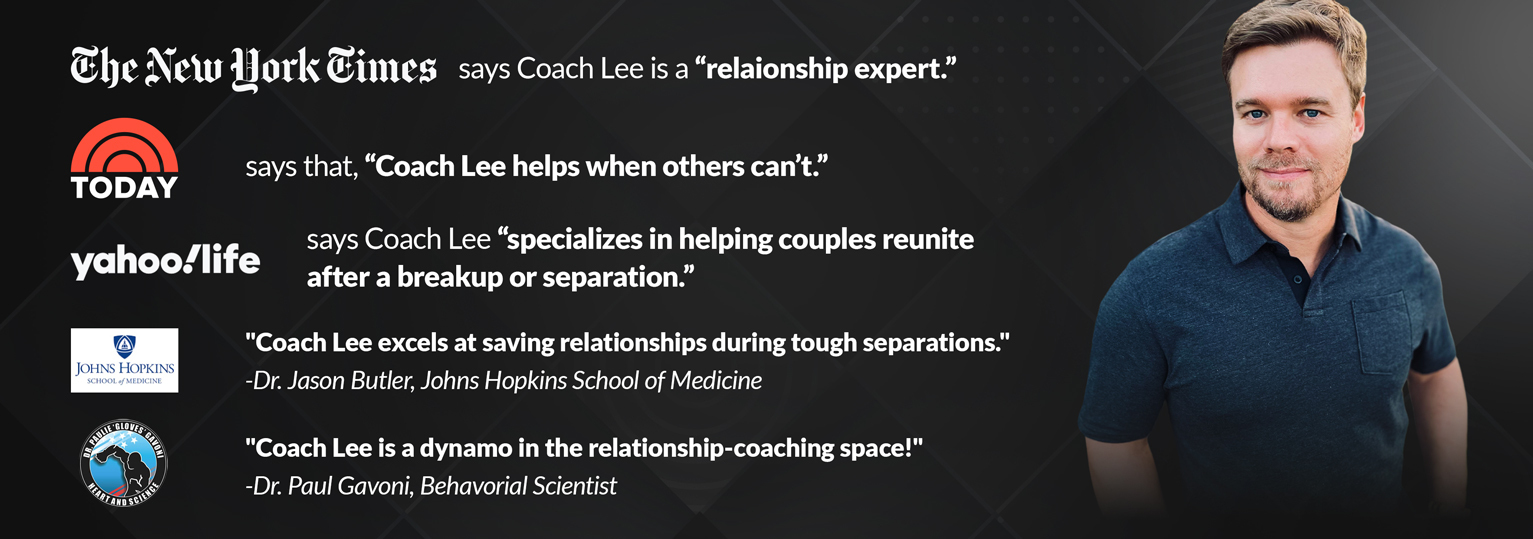
1.5M
Downloads
202
Episodes
Coach Lee is a world-renown relationship coach who helps people get an ex back after a breakup, save a marriage, and become more attractive. Lee has coached people in relationships since 2000. His website is https://MyExBackCoach.com and includes hundreds of articles and videos. Lee has lectured at Pepperdine University and others, is a TED educator on the science of breakups, and has been interviewed by major media including The New York Times, USA Today, The Today Show, New York Post, Men’s Health, L.A. Business Journal, Cosmopolitan, Daily Mail, Metro UK, Bravo TV, Yahoo Lifestyle, Glamor, and MSN among others. Lee uses real-life experience with breakups along with his work for 20 years providing relationship-recovery coaching. He has multiple certifications for relationship coaching & consulting. Get information on his Emergency Breakup Kit & Emergency Marriage Kit at MyExBackCoach.com. SUBSCRIBE to this podcast as well as on YouTube at https://youtube.com/myexbackcoach so you don’t miss videos on saving relationships, keeping love strong, and the science of attraction. INSTAGRAM @RealCoachLee
Episodes

Wednesday Jan 03, 2024
The No Contact Rule When You Have Kids Together
Wednesday Jan 03, 2024
Wednesday Jan 03, 2024
Navigating No Contact with Children: A Guide for Parents Seeking Reconciliation
Navigating the no contact rule while maintaining a healthy environment for your children can feel like walking a tightrope.
Accompanying articles: No Contact Rule With Kids Together and Shared
On Medium: No Contact When You Have Children Together
On Rumble: The No Contact Rule When You Have Kids Together
It's about balancing your personal healing with your duties as a parent, ensuring that the emotional and physical well-being of your children remains a priority.
Here's an expanded guide to help you through this challenging time:
-
Prioritize Parenting Time: Sharing children means that your paths will inevitably cross. The priority is to ensure that your children feel loved and cared for by both parents. Establishing a fair and consistent schedule for parenting time is crucial. This might mean alternating weeks, days, or significant events. It's not just about legally mandated time but about quality interaction. Be involved in your child’s daily routines, from homework to hobbies. Ensure that your home is a welcoming space for them, filled with comfort and routine. Document these efforts, not for the sake of potential legal battles but to demonstrate your commitment to parenthood. This establishes a framework where your children see both parents as loving and active participants in their lives.
-
Communicate Purposefully: Communication should be primarily about the children. Discuss their health, education, emotional well-being, and shared responsibilities. This is not the time for personal grievances or rehashing relationship issues. Instead, focus on constructive dialogue that benefits the children. Talk about their achievements, share funny stories, and discuss any concerns about their well-being. If necessary, use written communication to keep records and maintain clarity. Always approach these interactions with a calm and respectful demeanor, ensuring that the underlying message is one of cooperation and shared love for your children.
-
Legal Preparedness: Understanding your legal rights and responsibilities is not an act of aggression; it's a step towards informed parenting. Consulting with a legal professional can equip you with the knowledge to navigate custody, visitation rights, and any necessary financial arrangements. This ensures that you're not only acting in the best interest of your children but also protecting your relationship with them. It's about being proactive and prepared, not combative. Keep records of all interactions and agreements, and always prioritize the well-being and stability of your children in any legal decisions.
-
Uphold Respect: Children are perceptive and will pick up on negativity, tension, or disrespect. Therefore, it's vital to maintain a respectful tone when discussing or interacting with your partner in their presence. Refrain from any negative talk about your partner; instead, focus on encouraging a positive view of both parents. If your children express concerns or negative feelings about the other parent, listen attentively and guide the conversation towards understanding and empathy. Encourage them to maintain a loving relationship with both parents, ensuring they feel secure and loved.
-
Foster Family Bonds: While the no contact rule is about creating distance, it's also essential to recognize opportunities for positive family interaction. This could be during children’s birthdays, holidays, or significant events like graduations or recitals. Plan these events with the children's joy and comfort in mind. Encourage your partner's attendance and participation, creating an environment of civility and shared happiness for your children. These moments can serve as a reminder of the family unit's value and the joys of co-parenting when done with respect and love.
Navigating the no contact rule with children is a delicate balance of maintaining your personal boundaries and ensuring your children's happiness and stability. It's about making informed decisions, communicating respectfully, and always prioritizing the emotional and physical well-being of your children. By focusing on these expanded guidelines, you can navigate this complex journey with a clear conscience and a focus on the future well-being of your family. Remember, the goal is a harmonious co-parenting arrangement that allows your children to thrive and feel loved by both parents.

No comments yet. Be the first to say something!